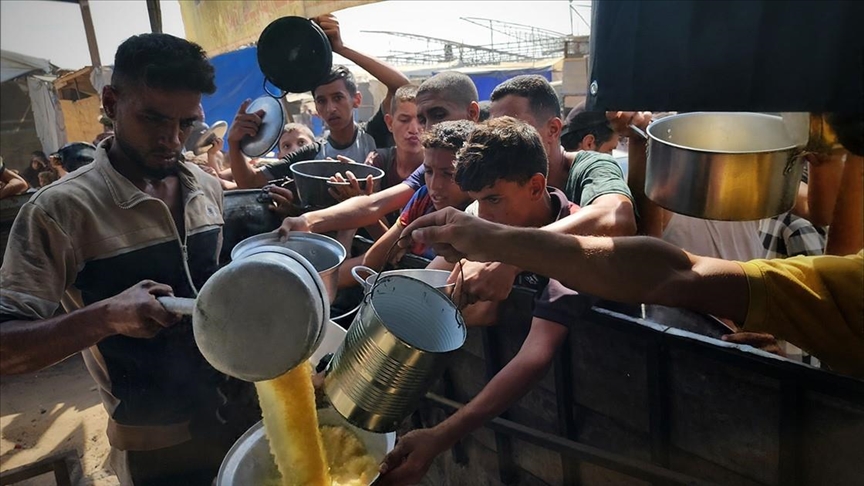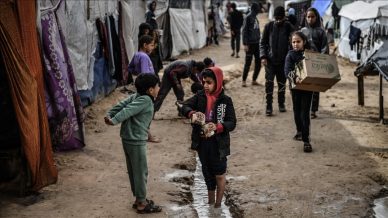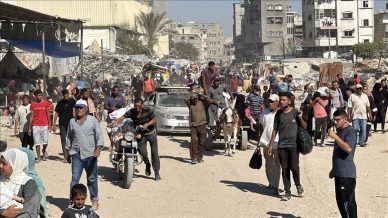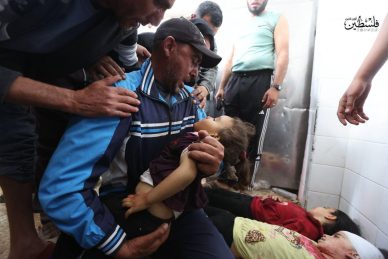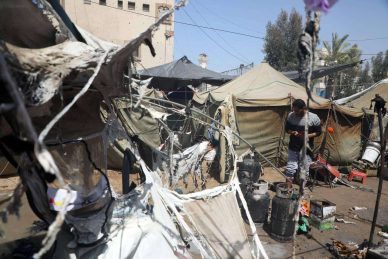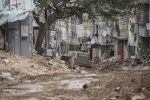GAZA, (PIC)
The humanitarian crisis in the Gaza Strip is worsening as the Israeli blockade enters more severe phases. Abdul Nasser Al-Ajrami, head of the Gaza Bakery Owners Association, announced the closure of most bakeries in the enclave due to a depletion of flour and diesel supplies, raising fears of famine among the besieged population.
In shocking statements, Al-Ajrami confirmed that the World Food Program officially notified relevant authorities in Gaza that its flour stocks were exhausted, meaning that the bakeries reliant on this supply for bread production have completely halted operations, leaving hundreds of thousands of families without a primary food source.
Residents of the Gaza Strip primarily depend on bakeries supported by the World Food Program, with 18 bakeries distributed across various areas of the region. These bakeries are a lifeline for tens of thousands of families already suffering from food insecurity. However, with their complete shutdown, the region faces unprecedented danger that could lead to a genuine humanitarian disaster.
Al-Ajrami said, “The situation is very serious; the closure of bakeries means that thousands of families will not find bread on their tables, and the catastrophe will worsen if the borders are not opened immediately to allow essential supplies in.”
He added, “We cannot operate the bakeries without flour and fuel. This crisis is not just a bakery crisis; it is a life crisis for hundreds of thousands of people who rely on bread as their main food source.”
In light of these grim circumstances, Al-Ajrami made an urgent appeal to the international community and humanitarian organizations to pressure the Israeli occupation to reopen the borders and allow food and fuel supplies to prevent the humanitarian crisis from worsening.
On March 2, the Israeli authorities closed the Gaza Strip’s borders to humanitarian, relief, and medical aid, causing an unprecedented deterioration in humanitarian conditions, as confirmed by local governmental and human rights reports.
Daily torment
In a scene reflecting the real food crisis in the Gaza Strip, Palestinians crowd in long lines outside functioning bakeries for hours to obtain cheap bread. Among them is Mahmoud Eid, who arrived at the bakery early on the first day of Eid al-Fitr in hopes of securing a loaf of bread to sustain his family.
Eid acknowledges the reality of a hunger crisis in Gaza due to border closures and the lack of flour in markets. He points out that arriving early after the dawn prayer does not guarantee quick service; instead, he often waits up to two hours for his turn.
A single bundle weighing 2 kilograms contains about 23-24 medium-sized loaves of bread, which Palestinians buy from the World Food Program-supported bakeries for a nominal price of 2 to 3 shekels.
Eid describes his daily struggle, like many heads of households in Gaza from north to south, as “a piece of endless torment, where one season of suffering ends only for another to begin in the quest to secure food for his three children… There is no water, no electricity, no food like what people have outside, and not even comfort when sleeping.”
Systematic starvation war
The Government Media Office (GMO) in Gaza emphasizes that the humanitarian crisis is escalating, with hunger visibly spreading among civilians. The occupation imposes a suffocating blockade on the entry of humanitarian aid, committing a described crime of extermination aimed at breaking the will of the Palestinian people.
In a statement on Tuesday, the GMO clarified that the occupation has completely prevented humanitarian aid from entering for a month, blocking 18,600 truckloads of aid, along with 1,550 trucks loaded with fuel (diesel, gasoline, and cooking gas).
Furthermore, it added: “As part of the starvation strategy, the occupation has bombed over 60 food distribution centers and aid distribution points, rendering them inoperative to facilitate the starvation crime. It has also bombed and targeted bakeries, stopping and closing dozens of them, leading to a worsening humanitarian crisis and a clear spread of hunger among civilians.”
Earlier, Dr. Ismail Thawabteh, the GMO director, reported that the occupation has bombed about 26 food distribution centers for displaced and hungry people and 37 aid centers since the beginning of the genocide.
The United Nations Relief and Works Agency for Palestine Refugees (UNRWA) announced on March 26 that the occupation authorities rejected most attempts by humanitarian organizations to deliver essential supplies to the Gaza Strip, which is on the brink of an unprecedented famine.
The agency said, “The situation in Gaza is deteriorating as violent hostilities continue for the second week.”
Bread crisis
Palestinian economic expert Mohamed Abu Jiab notes that the bread crisis in the Gaza Strip is no longer just about the availability of flour, but rather the absence of means to produce and manufacture bread.
He explained in a conversation with Anadolu Agency, “Citizens do not have the gas needed to make bread, and most family or municipal bakeries have stopped operating due to border closures.”
Abu Jiab clarifies that some families, despite having limited flour supplies, are unable to bake due to the lack of gas, firewood, or electricity.
During the period from the ceasefire agreement to the closure of borders, Palestinians were baking their own bread; however, with the new crisis, they have turned to waiting in lines at bakeries.
He confirms that World Food Program-supported bakeries have become the only refuge for Gazans to obtain bread, and their closure would lead to real hunger if the border closures persist.
He continued, “The price of a bread bundle reaches 2 shekels and is sold at distribution points for 3 shekels, which constitutes 25-30% of the actual price of a bread bundle.” He noted that the amount received by the bakery covers part of its operational expenses.
Abu Jiab attributes the crowding at bakeries to the lower cost of bread compared to baking at home, as flour prices have surged since the border closures, with a 25-kilogram sack rising from 30-40 shekels to 100 shekels.
Scarcity of food supplies
During the months of extermination, Palestinians have suffered from famine due to the strict restrictions imposed by Israel on the entry of aid, forcing them to consume alternatives such as animal feed and grass while reducing daily meals and quantities.
The closure of bakeries in the Gaza Strip means not only the unavailability of bread but also extends its impact to other aspects of life, as most poor and displaced families rely on humanitarian assistance that includes bread. When this is cut off, access to food becomes increasingly difficult.
Moreover, the rising prices resulting from food scarcity will make it impossible for poor families to secure their daily sustenance, leading to increased cases of malnutrition, especially among children and the elderly.
The Gaza Strip has been under a suffocating blockade imposed by Israel for years, with about 80% of the population relying on humanitarian aid. The crisis has worsened since the genocide, with hundreds of thousands of day laborers losing their income and relying on what UN organizations provide in humanitarian aid through the Kerem Shalom crossing. With the bakeries now closed, these residents face the real threat of famine with no solutions in sight.

